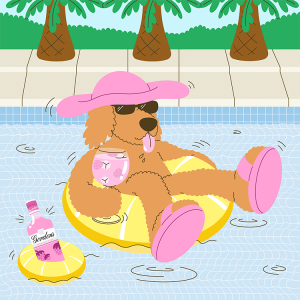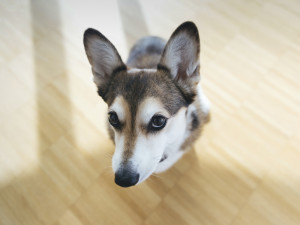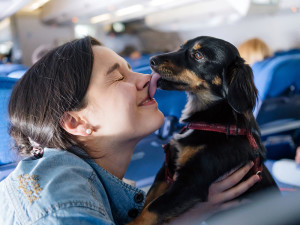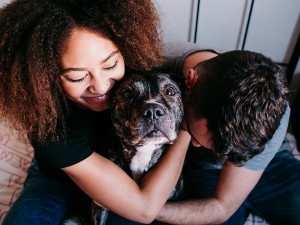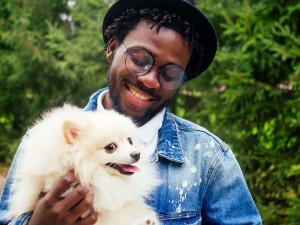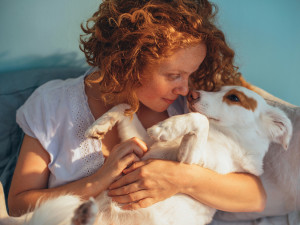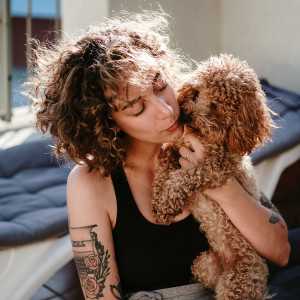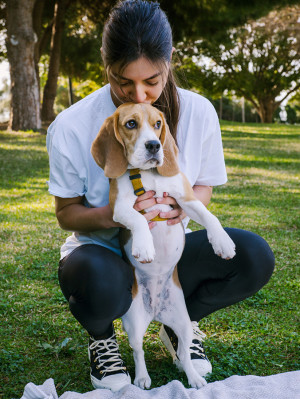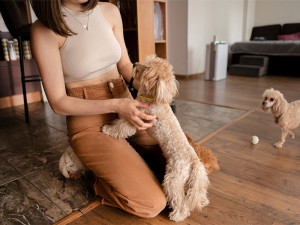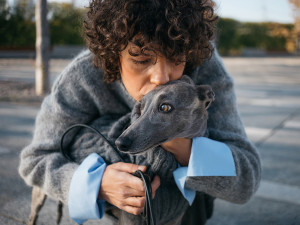Do Dogs Love Their Human Parents?
You can certainly feel the love.

Share Article
In This Article:
Science Behind Dogs Loving Their Parents Signs Your Dog Loves You How to Show Your Dog You Love Them Back How to Improve Your Connection With Your Dog
There’s no question that you love your dog. You can’t get enough of their adorable face, and your phone’s photo roll is probably stuffed (maybe even completely full) with photos of them sleeping. But does your dog love you back? And how can you show your dog that they’re the center of your world (and a perfect angel)?
“It’s hard to say what signs show your dog loves you,” dog trainer Robert Haussmannopens in new tab says. “It is easily anthropomorphized and subject to unhealthy interpretation.” That said, he notes that “seeking your company and physical contact could mean your dog likes to be around you.”
And those aren’t the only signs. We’re all curious about dog behavior, and scientists have done plenty of research into how dogs interact with humans and show affection.

The science behind dogs loving their parents
“Does my dog love me?” is a question most pup parents ask at some point — and science has answered. In one studyopens in new tab, scientists studied dog brain activity to learn what happens in a dog’s head when they hear their parent’s voice. They discovered that there is a strong bond between dogs and humans, evidenced by the way their auditory cortex lights up when they hear happy sounds, including their parent’s voice.
Another study focused on how dogs will look humans in the eyeopens in new tab — unlike wolves — which is a method dogs use to communicate with their human companions. And researchers have also compared dog pups to wolf pupsopens in new tab and learned that dogs are far more attracted to humans and able to understand human gestures.
Animal cognition scientists studied dogs’ powerful sense of smellopens in new tab to examine canines’ emotional state when they scent their parents. They found that, when dogs smelled their humans, the “reward center” of their brains was activated. And additional research has proved that oxytocin (aka the “love hormone”) is present when humans and dogs interact.
Signs your dog loves you
So, how do dogs show affection? You may be wondering, “How do I know if my dog loves me?” Chances are your dog has been demonstrating their love for a while, through their excitement when you return home and a wagging tail. But some ways may be a bit more subtle. Learn how to tell if your dog loves you.
They lean against you.
For dogs, leaning is a lot like a hug — a way to be physically close to the person they love. This gesture may seem simple, but it shows that your dog trusts you and wants to be near you.
They recognize your name.
Not only can dogs learn their own names (and other words), but they may even learn your nameopens in new tab. Over time, your dog may recognize your name and even be excited when they hear it.
They love to lick you.
Yes, licking is a sign of affection — and you can definitely call it kissing. Some dogs show their love through intense licks, although this can also be an attention-seeking behavior, so see if your dog wants to play or cuddle.
They follow you everywhere.
Can’t go to the bathroom without your dog trailing along behind? That’s because they just can’t get enough of being around you. Their constant presence is one sign if you’re wondering how to know if your dog loves you.
They look you in the eyes.
Direct eye contact can be a sign of aggression in dogs, which is why one will look away when two dogs meet for the first time. But if your dog meets your eyes with a relaxed look, they’re giving you a loving (and trusting) gaze.
They bring you presents.
Okay, maybe you didn’t want the stick your dog found in the park or their torn-up favorite toy, but at least appreciate the gesture. They want to share their favorite things with you!
They love you almost as much as food.
Dogs tend to be very food-driven, and they will ditch you in a heartbeat when it’s meal time. But if your dog comes right back to you once their bowl is empty, that’s a sign of love.
How to show your dog you love them back
Your dog loves you, and you know you love your dog back, but you keep wondering, “Does my dog know I love him?” Fortunately, there are ways you can show your dog just how much you adore them.
“We can show dogs love by giving them a rich, healthy life,” Haussmann says. “Lots of exercise, playing together, mental stimulation, and environmental enrichment for starters. Train through games and positive reinforcement and allow your dog autonomy and choices.”
Try these tips for how to tell your dog you love them — without words.
Enjoy more playtime.
If you’re wondering how to show your dog you love them, you can’t go wrong with a little extra playtime. Whether your dog loves fetch or a little tug of war, get out the toys and have fun!
Snuggle up.
Cuddle with your pup on the couch or in bed. Just like with humans, physical closeness can be a sign of dog love and affection.
Talk to your dog.
They may not understand every word you say, but your dog enjoys the sound of your voice. Taking the time to engage with them can show your pet just how much you love them.
Scratch those ears (or butt or belly).
Pet your dog in their favorite spot. Paying attention to how they love to be scratched and pet can show your dog that you care.
How to improve your connection with your dog
If your relationship with your dog isn’t where you’d like it to be, don’t fret! You can put in some extra work to improve your connection with your pup by following these tips:
Pay attention to your dog’s body language — responding to their cues can help you build a stronger, long-lasting bondopens in new tab.
Learn how your dog communicates so you can better understand their wants and needs.
Show your love by taking the best care of your dog with a healthy diet and occasional tasty treats.
Demonstrate physical affectionopens in new tab with cuddling and snuggling.
Head to the dog park and go on more walks.
“If you want to improve your relationship, take a class together or take up a dog sport,” Haussmann says. “Start walking together once or twice a day. Do some regular training together and play, play, play!”
FAQs (People also ask):
Has my dog imprinted on me?
No, imprinting isn’t just a thing from the Twilight series. During developmental periods, dogs (and other animals) can imprint on a specific human. Here are a few signs that your dog may have imprinted on you:
Following you closely (and everywhere!)
Quickly obeying your commands
Wanting to hang out with you
Mimicking your behavior
Making eye contact with you
Do dogs pick a favorite person?
Dogs often pick a favorite person in the house, and it’s usually the person who spends the most time with them or is a huge part of their routine. So, if you’re the one who always plays with and feeds your dog, they may decide you’re their favorite!
Why is my dog suddenly obsessed with me?
If you notice your dog paying more attention to you than usual, they may be feeling anxious and are seeking reassurance or comfort. New situations or changes to their environment — like a new home or a new member of the family — can make dogs act a little needier, so make sure to reassure them with plenty of love and attention.
How do you know if your dog doesn’t like you?
Worried your dog isn’t a fan of you (remember you can always work on your relationship!). If you’re wondering how to tell if your dog likes you, look for these signs that they might not like you as much as you’d prefer:
Growling or barking at you
Avoiding direct eye contact
Hiding from you or keeping their distance
Refusing treats from you
Attempting to bite you
References:
Cooperative Communication with Humans Evolved to Emerge Early in Domestic Dogsopens in new tab
Dog and Owner Characteristics Affecting the Dog-Owner Relationshipopens in new tab
Dog-Human Relationship Affects Problem Solving Behavior in the Dogopens in new tab
Voice-Sensitive Regions in the Dog and Human Brain Are Revealed by Comparative fMRIopens in new tab
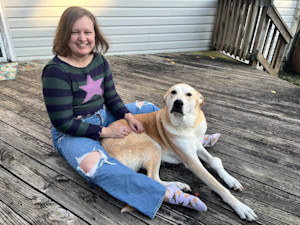
Savannah Admire
Savannah Admire is a writer and pet mom to two dogs and a cat. Under the name Savannah Cooper, she has published poetry in 40 different publications, as well as a poetry book, Mother Viper (2025). When she’s not writing, you can find her reading, taking photos, or volunteering as a content creator for her local community theatre. As a pets writer, she focuses on cat and dog behavior and pet parenthood. She currently lives in Western Maryland.
Related articles
![Man hugging his fluffy white dog happily]()
Chemistry Between People and Dogs Is Real (It’s Science)
How the “love hormone” oxytocin connects us with our pups.
![A woman holding her dog close.]()
FYI, Your Dog Can’t Stand When You Do These 7 Things
Thanks, they hate it.
![Curly haired woman with tattoos holding her Labradoodle dog up to her face in a tender embrace]()
How Deep Is the Love for Our Dogs?
The connection between people and dogs is the stuff of legend.
Do Dogs Like Getting Kisses?
No, your dog might not like receiving kisses as much as you like giving them.
![A woman sitting on a floor playing with her dogs.]()
How to Know if Your Dog Has Imprinted on You
If they’re following you around like your shadow, there’s a reason for that.
How to Tell If Your Dog Is a Hugger—Or Not
Boundaries, folks. Boundaries.

